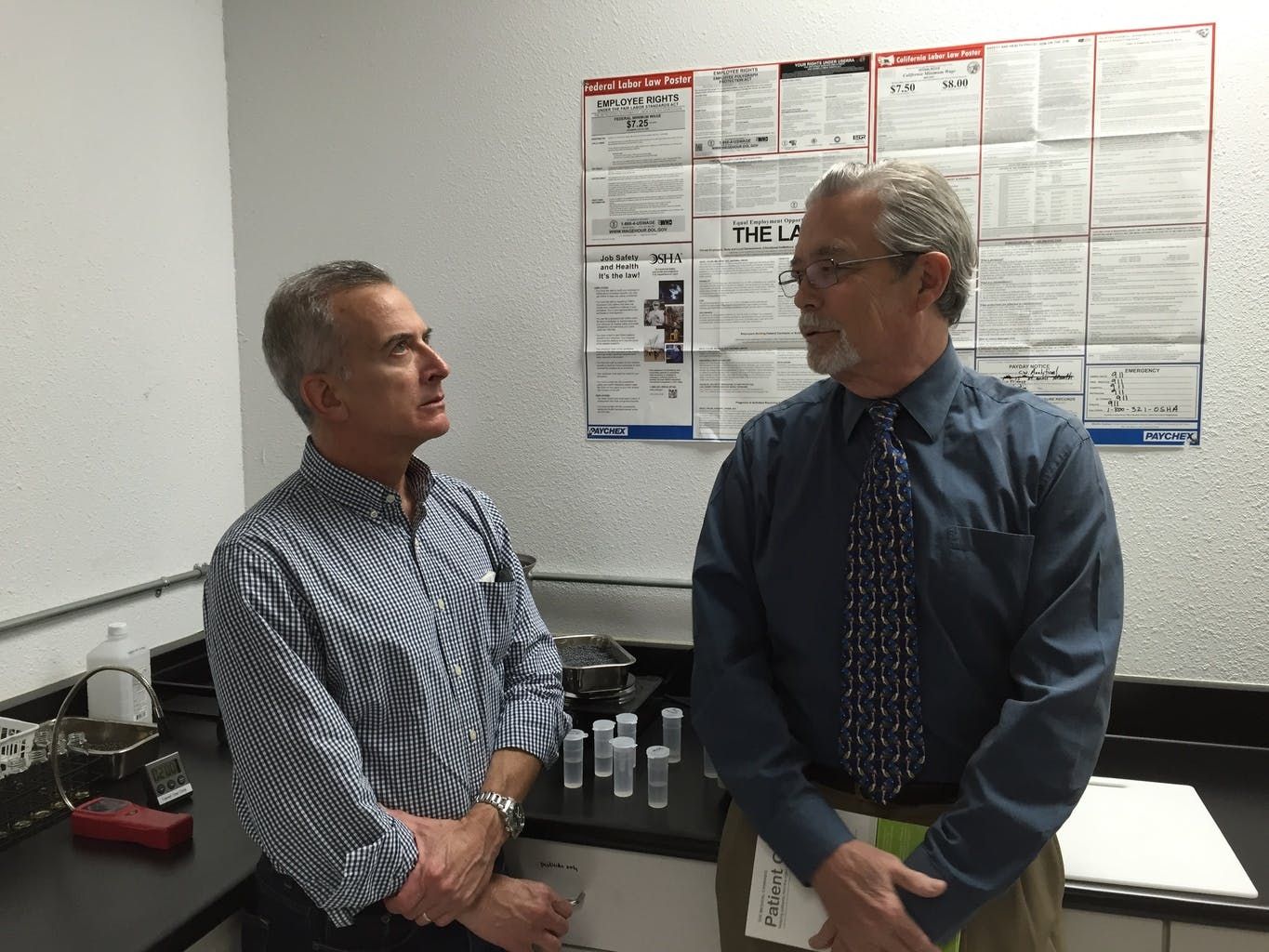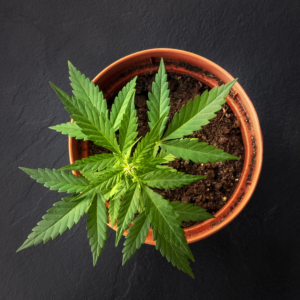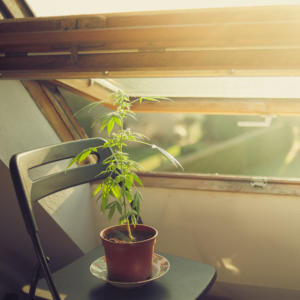An interview with Dr. Robert Martin – Co-Founder of CW Analytical Testing Laboratory
What does CW Labs do?
We started our lab so that we could: educate patients on the need for testing, provide the clearest, simplest representation of accurate lab test results, and provide dispensaries and growers with the ability to carry out thorough testing on their products at an affordable cost. Our end goal is to provide the safest possible products to the patient and hopefully, in the process, educate patients as to why testing is important. We, at CW labs, believe there should be more industry regulations that mandate consistent testing by growers and dispensaries. The more quality control required, the better it is for patients and the industry as a whole. Our ultimate goal is to legitimize marijuana through testing and education.
Our lab has been designed to mimic labs used in the food industry, an area in which I have been involved for many years. We have our lab set up so that when new product comes through the door, it goes through the same sequential set of tests every time. Consistency in our testing is important for accurate and comparable results for all of our products. My preference for lab design is a horse-shoe pattern: a product enters on one side of the horse-shoe, works its way around the curve, and ends on the other side of the horse-shoe. I aim to keep the lab quiet, a focused environment is fundamental to decrease possibility of error. We believe in consistency. We are committed to a rigorous scientific process to provide the most accurate results that we are able to. Not all labs or facilities have actual scientists or people trained in the scientific process to run the tests like we do. Tests must be conducted more than once in order to provide corroborated, truly valid results. If we test a product for a bacteria and we find that bacteria, we promptly retest the product to make sure those results are accurate. There are liabilities in running a lab. We want to make sure that we have done our job properly and protected the patient to the best of our ability to prevent patients from illness as much as possible.
Who submits their products to testing?
We find that the majority of people who come to us are dispensaries, however, growers do come to us as well. In our experience about 90% of the dispensaries in the East Bay test their products, whereas only about 60% of the dispensaries in San Francisco test their products regularly.
Why should a dispensary test?
Patients are often not aware of what might hurt them. Any dispensary that sells medicine should have the patient’s best interest at heart, but often they do not. We regularly see things in the medical marijuana products that would be extremely alarming to many of our patients. For instance, we saw the presence of cholinesterase inhibitors, a neurotoxin, from multiple growers for a 3-4 month span of time. Apparently, a new product was introduced that was intended to kill mites and multiple growers had started to use it. It is only because the product was tested and the toxin was detected that we saw a decline in the use of the pesticide.
We have seen a new cycle emerging in this industry: growers use a new un-tested chemical on plants that turns out to be harmful to consumers, when the products are tested by dispensaries these chemicals show up in the results, and then pressure for them to stop using the chemical. The patient and the industry need to put pressure on the dispensary to test all products before they are released, so none of these harmful products fall through the cracks. It is exceptionally irresponsible to subject sick patients to untested, potentially harmful medications. Ethical dispensaries, who test their products regularly, have the ability to transform the growing industry by forcing the growers and producers to clean up their act.
What does you lab test for?
We test for cannabinoids, the CBD to THC ratio, pesticides, microbiological material, such as ecoli, terpins, and residuals of any kind and the DNA. We also test for yeast and fungi. Fungal abatement is important. An organic grower may lose about 20% of the crop due to fungus. That said, I believe that organic, outdoor grow operations create a higher quality product with less risk to the patient overall. Additional things that we may test for are growth hormones and Aflatoxins. When we test the bud, we use a randomly selected specimen from each one pound bag. The cost for an average dispensary is around $120 per one pound of bud we test, it adds up to about 28.7 cents per gram for the dispensary, which is affordable.
We look for microbiological material and bacteria in products. Typically, the living plant will have none of the bacteria we look for, perhaps due to the amount of terpenoids present. Once the plant is harvested, however, that is when the plant normally starts to collect bacteria. How it is stored and handled greatly effects what is on the cannabis product (i.e. Are gloves used in the harvesting process? Where is the plant put after harvesting? How sterile is the processing area?), often just changing hygiene protocols will yield dramatically better results.
We test for 33 of the most commonly used pesticides, as dictated by the EPA. Pesticides are an awful thing to have in medication, they do not break down in your body no matter how you ingest them. Having pesticides in ones body is not good for their health in any way. Patients should be aware, also, that when concentrates are made from cannabis that have been treated by pesticides, the pesticides are in an extremely concentrated state just like the marijuana.
We typically see a 20-30% failure rate from new dispensaries’ products the first time we test them. With in 3-4 months the dispensaries with failures usually return with almost 100% passing products. When the dispensaries understand how their products are harmful, they usually shape up, which is great for the patient.
What happens when a product has a negative test result?
We inform dispensaries of their results immediately. If it is a contamination like E.coli we get on the phone right away to inform them of the issue with their product. Dispensaries are responsible to do the right thing when their results are negative, we have no jurisdiction to take personal action. Not all dispensaries will do the right thing by pulling the product off their shelves, but then again there are many dispensaries who will never test to begin with.
What misunderstanding do you commonly see?
Many people, including dispensaries, do not understand that lab results do not represent an absolute. There are variables in all tests and results. Absolutes are theoretical and there is variation in just about everything. So, for instance, even in Big Pharma, there is about a 7.5% allowable variation. In the food industry there is about a 20% variance. Here at CW labs we have accomplished about a 10% variance, which compared to the food industry, is really an amazing result to achieve. Another thing people often do not understand is dosages. The medical marijuana industry is based on milligrams, which is often hard for people to get their arms around.
What excites you about where CW labs is today?
We want to give back to the patient. Our goal is to educate and help reform an industry that needs stronger regulation, whether that comes from the inside or outside. Based on the lack of regulation we have witnessed, I helped found an organization called the ACCL (Association of Commercial Cannabis Laboratories), which is dedicated to addressing the lack of regulation in the industry with the hopes of creating the highest standards possible. One thing that we do on a yearly basis is allow for a 3rd party to send independent labs products. We in the ACCL all test these products, then we post our results publicly. We believe in reliability and accountability and we follow strict guidelines as a whole to work towards achieving those goals.
What I have seen as this industry has grown is that there is a new type of cannabis patient. It is a 66 year old woman with chronic pain or a 70+ patient who wants to get off heavy prescription medications. We want to be able to help inform them, allow them to make smart choices, and ultimately provide them with the safest possible medication.






